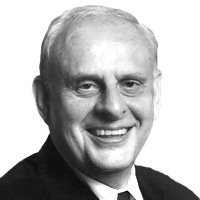
There they were, the three amigos—Presidents Obama, Zardari of Pakistan, and Karzai of Afghanistan—standing shoulder-to-shoulder in Washington. And there was the Pakistani army, engaging the Taliban in their new strongholds so close to Islamabad. And now, we will see if the army sends sufficient force to the area for the first time, if it has any idea how to fight insurgents like the Taliban rather than the Indian battalions, and whether Afghanistan and Pakistan are capable of the “C” word—cooperation—which spilled liquidly from their leaders’ lips in Thursday’s press conferences.
The combined packages could total more than $25 billion over the next two or three years. This was withheld from the press to avoid the appearance that Washington was bribing the two presidents to do the American bidding.
Obama said they were all resolved “to take out our common enemy.” Richard Holbrooke, the U.S. envoy for the region, summed up the performance: “I hope that the American public sees that we’re making progress in the quest for real cooperation between Afghanistan and Pakistan, because without that cooperation, success is not achievable.”
Come behind the performance for a moment and see how the “progress” and “cooperation” were attained. The first was the private, then public, minuet of reassurances to the two visitors. Obama is said to have privately told Zardari and Karzai that the security of their three nations was “linked,” and that the commitment of the United States “will not waver.” Then, he used those very same words publicly. Often in high-level diplomacy, key points made in private are restated publicly to underline their seriousness. In effect, Obama was telling them that America is there for them, and we won’t disappear when things get rough, as foreigners often fear we will.
The public didn’t get to hear about the private hints—or possibly more than hints—that Washington was prepared to back up its reassurances with cash and arms. Obama’s point was that if the Afghans and Pakistanis demonstrated real resolve in the fight against the Taliban, they should expect even more than the already promised military and economic aid. Though nothing was spelled out, the combined packages could total more than $25 billion over the next two or three years, if Congress is willing. All this was withheld from the press because none of the parties wanted it to appear that Washington was bribing the two presidents to do the American bidding.
Finally, Obama and his team put enormous pressure on the visitors in the private talks. Everything was lovey-dovey in public. In private, the American side was quite blunt and direct. Neither leader and, neither government, Obama stressed, was keeping its promises and doing what was necessary to defeat the common Taliban foe. The Obama team has no illusions about how much it can count on the word of the two visitors. Their governments are corrupt and largely dysfunctional. Their own peoples don’t care much for either of them. But, and this is a big but, the two visitors also know that Obama is in a self-made trap. On the one side, he insists we’re in this to the end. On the other, he’s hinting that if the Afghan and Pakistani presidents don’t deliver, we’ll take our economic and military marbles—which they need to survive—and go. Obama felt he had to make both points, but they don’t fit comfortably together.
Perhaps the best thing the three amigos have going for them is the behavior of the Taliban in their newly possessed territories inside Pakistan. They are already acting with their trademark brutality and fanaticism, and Pakistani refugees are streaming from Taliban clutches. One can hope these refugees will carry the message that these monsters are far worse than the corrupt and inept governments of Zardari and Karzai, and that the Afghan and Pakistani people must fight back.
Leslie H. Gelb, a former New York Times columnist and senior government official, is author of Power Rules: How Common Sense Can Rescue American Foreign Policy (HarperCollins 2009) which shows how to think about and use power in the 21st century. He is president emeritus of the Council on Foreign Relations.
Xtra Insight: Read Leslie H. Gelb’s in-depth analysis: Behind the Obama-Zardari Love Fest





